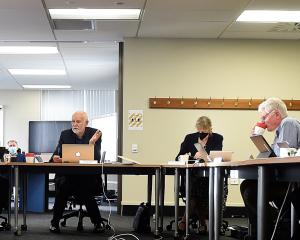The Southern District Health Board's decision to transfer the multimillion-dollar home care contracts from local providers is cynical, contrived, economically flawed and commercially naive, writes Ray Macleod.
I am an independent director of Presbyterian Support Otago (PSO), have been for almost 10 years and I chair the finance committee. My background is as an engineer and economist and I work in the commercial sector based in Dunedin. I examine businesses, business cases, operational processes and complete feasibility studies for varied clients. I also compete for crown contracts in a different sector but under similar processes to the Home Support Service process operated by the Southern District Health Board.
I was employed for 13 years by Otago Hospital and district health board predecessor organisations of the SDHB and understand the basics of its operation. I like market forces and have no issues with competition either domestically or overseas-based. I do, however, have an issue with the exclusion of PSO from the provision of home support services by the SDHB. The process followed we understand was not price-based but service delivery-based, so price was apparently not a consideration. I do believe the decision to be cynical, contrived, economically flawed and commercially naive.
I have put much energy into trying to understand the economic thought, commercial reasoning and strategy of the SDHB's decision. I am baffled. We are not seeking to undo the decision but there is room to be included. We currently care for 42% of the home support clients in Otago/Southland (along with Disabilities Resource Centre Southland).
We have staff, infrastructure and networks in place built up over 106 years. We invented the service as it exists and quality of service is not an issue. Perversely, the decision, I believe, firstly relies upon misuse of statute in the form of the vulnerable workers provisions of the Employment Relations Act. The SDHB generously adopted a favourable, to it, interpretation of what constitutes a vulnerable worker under this Act.
That sounds charitable of the DHB. It is self-serving and marginalises the PSO's staff, treating them as chattels tradeable between competing interests under the SDHB direction. It places 370 valuable employees in an employment pen allocated to one of three potential employers along with the clients. Like sale day at a stockyard. Many of our team are not vulnerable in reality and haven't taken kindly to the SDHB action. Many choose to work for PSO because of its community links, reputation and culture and may prefer to decline transfer.
The SDHB has offered to support the transfer of non-vulnerable key staff. It has to do this. If it doesn't, its decision will be compromised, perhaps fatally, and difficult to implement. This reinforces my view that the SDHB is cynically using statute to give its decision form, strength and economic value. If the DHB project team didn't do this, it had nothing to sell its own board. We understand it didn't place a financial risk analysis for transition matters in front of its own board and I doubt it had the forethought to seriously consider resistance to its decision, not just by PSO but by staff members, wider interest groups and communities. In my view, the board made a decision with an incomplete risk analysis around a number of matters.
Disconcertingly, the SDHB board, a community-based taxpayer-funded entity, has refused to meet PSO, the region's largest community-based health service provider, to discuss our real concerns. We are reluctantly airing these concerns publicly. The DHB project staff advised that a probity auditor was employed to ensure the right boxes were ticked and the proper process was followed. This does not influence the quality of the decision. One party, it appears, does not have a client or employee in the area. The SDHB simply seeks to transfer the PSO business. The SDHB believes the transfer is riskless and costs minimal.
It believes its chosen providers will enter seamlessly and fully equipped even if one doesn't have any resource in the district. The transfer costs will be hundreds of thousands of dollars. This before considering the risk to not achieving sufficient staff transfers if all providers are to meet their own regional coverage requirements.
Any PSO surplus from home support activities is invested in service enhancement, training and coverage. We distribute dividends to the community. A loss we shoulder without complaint. PSO has a robust financial history, the envy of many. We also have 600 volunteers with us, including me, who support these services. We are unlikely to transfer. The risk is the SDHB may be poorly advised and got this wrong.
During the past five years, PSO has invested $325,000 into its home support staff for education and training over and above any contractual requirements. We possess infrastructure and networks the envy of the industry. We are expected to provide this to competitors, apparently at no cost. The SDHB wishes to transfer this investment to others.
Without our operational platform, the DHB would struggle to consider an organisation with no available resource, to implement its decision. The DHB can't transfer community loyalty. There was an unwillingness to engage with PSO to consider options. To quote, ''The board has made its decision and won't change its mind.''
I give full credit to any board capable of considering matters and reversing decisions on the back of better advice. Ignoring us isn't useful.











